March 25, 2025 (Addis Ababa, Ethiopia): As the fight against Tuberculosis (TB) and HIV continues across the IGAD Region, the Intergovernmental Authority on Development (IGAD) in collaboration with UNHCR, Kenyan Red Cross Society – KRCS, and Refugees and Returnees Service – RRS held a joint review of the third-year performance of the Global Fund-supported TB/HIV grant. This review will assess progress, address gaps, and chart a course for sustaining the achievements made in refugee camps and cross-border health facilities.
Since April 2022, the grant has been instrumental in strengthening TB and MDR-TB diagnosis and service provision in some of the most vulnerable communities. By enhancing cross-border collaboration between National Tuberculosis Programs (NTPs) and National AIDS Programs (NAPs), the initiative has bridged refugee healthcare gaps, ensuring they receive timely diagnosis, treatment, and care. Over the past two years, the program has achieved a 96% performance rating, demonstrating its effectiveness in addressing TB/HIV co-infections in displacement settings.
At the opening of the review meeting, Mr. Onyari Josephat, Director of Administration and Finance, emphasised the significance of the Annual Joint Review Meeting in tracking grant performance and facilitating experience-sharing. “As the continuation grant concludes on March 31, 2025, this year’s meeting presents a critical opportunity to assess our final-year progress, document key lessons, and strategize on sustaining achievements. A major focus will be on integrating grant-supported activities into national health systems to ensure long-term impact. This exchange will enhance knowledge-sharing and promote best practices, strengthening healthcare sustainability across the region.”
As the grant closes, the annual review will provide a platform for key stakeholders—including government health officials, refugee commissions, UN agencies, and implementing partners—to evaluate the year’s achievements and discuss strategies for sustaining interventions beyond the grant period. With TB and HIV remaining major public health threats in the region, ensuring continuity of services is crucial to protecting displaced populations and fostering resilient health systems.
Participants will engage in discussions on lessons learnt, challenges, and the transition of key interventions into national health programs. The review will also inform the development of the grant closure plan, ensuring that the progress made is not lost but integrated into existing frameworks for long-term impact.
Hassan Abdi, Regional Coordinator at UNHCR Regional Bureau – East, Horn of Africa, and Great Lakes, commended the dedication of all stakeholders in implementing the grant. He highlighted key achievements since its inception in 2017, including increased TB notification rates, expanded diagnostic capacities, and greater access to GeneXpert machines across more than 70 refugee camps. He also noted the significant rise in TB treatment success rates and underscored the importance of cross-border collaboration in strengthening regional health systems. As the grant concludes, he urged stakeholders to build on these successes and ensure the sustainability of healthcare services for refugees and host communities.
As IGAD and its partners gather in Addis Ababa for this essential meeting, the focus remains on securing lasting solutions that safeguard the health and well-being of communities across the region. The commitment to cross-border health collaboration continues to be a vital step in strengthening regional resilience and advancing health equity for all.
Ali Sillay, Chair of CCMI Djibouti, highlighted the importance of the meeting in assessing the grant’s impact, particularly in strengthening TB diagnostic capacities and service delivery in refugee camps. While acknowledging the challenges posed by TB and HIV co-infections, he emphasized the critical role of integrated TB/HIV services and the need for continued cross-border collaboration. He also welcomed the participation of stakeholders from across IGAD member states, underscoring the value of collective efforts in ensuring the sustainability and continuity of healthcare interventions across the region.
The meeting concluded successfully, with the Member States having comprehensively reviewed the third-year grant performance, assessed key achievements, and identified unaccomplished activities at the SRs/SSRs level. The insights gathered will inform the grant closure plan, ensuring a smooth transition and the sustainability of critical health interventions within national systems.

